Russia, aside from being by far the geographically biggest country in our service region, is one of only three countries with more than a thousand LIRs. We look at the stats from Russia and compare it to the other two countries with over 1,000 LIRs.
The RIPE NCC service region comprises over 75 countries, and by far the largest in terms of geographical size and population is Russia. In 2017, we will spread our outreach efforts across the country by hosting member lunches in the cities of Kazan, Moscow and Vladivostok, while the ENOG 13 Meeting will take place in St. Petersburg from 23 - 24 May 2017.
In terms of number of LIRs, Russia comes third after the UK and Germany. In this latest article focusing on countries using data available at the RIPE NCC, we concentrate on Russia and compare it to the only other two countries with over 1,000 LIRS. Figures in the table below for area and population are from Wikipedia.
| Country | Population | Area (km2) | LIRs |
|---|---|---|---|
| Russia | 146,804,372 | 17,098,246 | 1,404 |
| Germany | 82,800,000 | 357,114 | 1,557 |
| UK | 65,110,000 | 331,652 | 1,798 |
Please note that this article, unless otherwise noted, shows a snapshot of the situation as seen on 3 April 2017. However, in most cases we also provide a link to the most up-to-date information.
Russia at a glance
| Number of ASNs assigned | 5,822 |
| Number of Local Internet Registries | 1,404 |
| Number of IPv4 allocations | 4,616 |
| Number of IPv4 assignments | 3,270 |
| Number of IPv4 addresses allocated | 40,818,688 |
| Number of /22s allocated from the last /8 | 1,187 |
| Number of LIRs with IPv6 allocations | 1,005 |
| Size of IPv6 allocations (/32s) | 4,215 |
| Number of IPv6 assignments | 208 |
| RPKI with route object authorisation (ROAs) | 115 |
Membership Growth
In Figure 1, you can see the growth of the number of Local Internet Registries (LIRs) in Russia, Germany and the UK from 2010 to 2017. As of 5 April 2017, there are 1,404 LIRs registered in Russia. The chart shows data up to the end of Q1 2017.
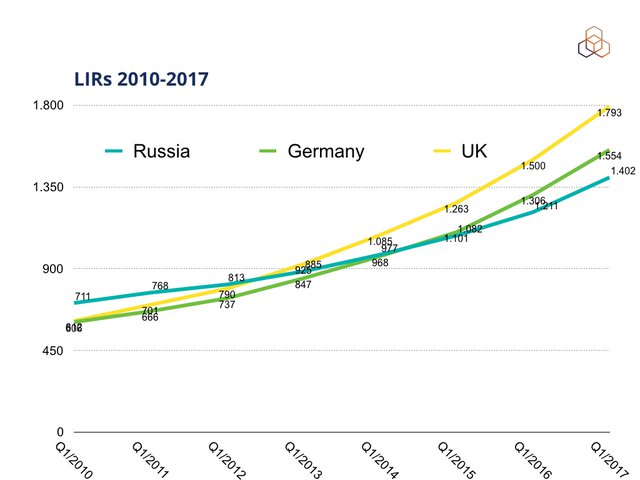
Figure 1: Number of LIRs in Russia, Germany and the UK from 2010 - 2017
For comparison, Figure 2 shows the growth in the number of all LIRs registered with the RIPE NCC since 2008. There are currently over 15,700 LIRs registered with the RIPE NCC. Note that the numbers for 2017 only contain data up to the end of March.
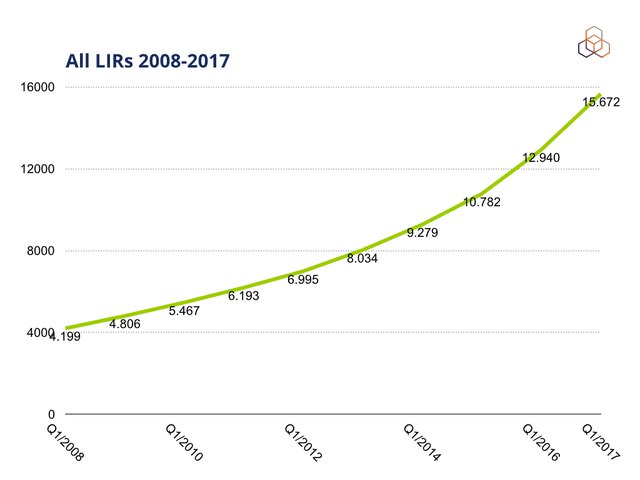
Figure 2: Number of all LIRs in the RIPE NCC service region from 2008 - 2017
The next figure shows the age of the LIRs in Russia. You can see that 322 LIRs in Russia have joined the RIPE NCC in the past two years. In contrast with the overall picture for LIRs in our service region where the largest segment of LIRs are those that joined in the past two years (Figure 3b), the biggest group of Russian LIRs are at least ten years old (438 LIRs).
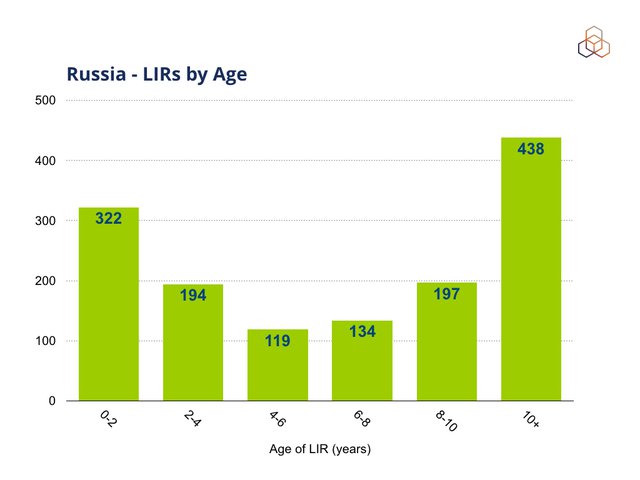
Figure 3: Age of LIRs in Russia
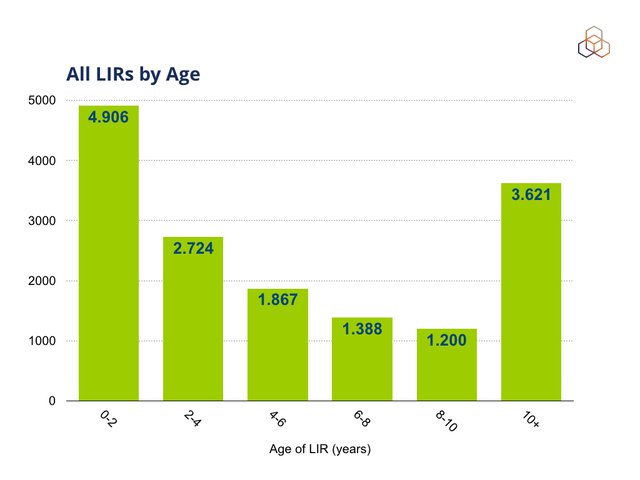
Figure 3b: Age of all LIRs in RIPE NCC service region
IPv6 Deployment in Russia
IPv6 RIPEness is a rating system that awards stars to LIRs in the RIPE NCC service region depending on indicators of IPv6 preparedness. Stars are awarded for:
- Having an IPv6 allocation or assignment from the RIPE NCC
- Making the IPv6 prefix visibility in the Routing Information Service (RIS)
- Having a route6 object registered in the RIPE Database
- Having reverse DNS delegation set up for the IPv6 allocation
Figure 4 shows the situation in Russia. You can see that 72% of all LIRs in the country have an IPv6 allocation and 628 Russian LIRs (42%) have done something with their IPv6 allocation. And 28% (or 399 LIRs) don't have an IPv6 allocation yet.
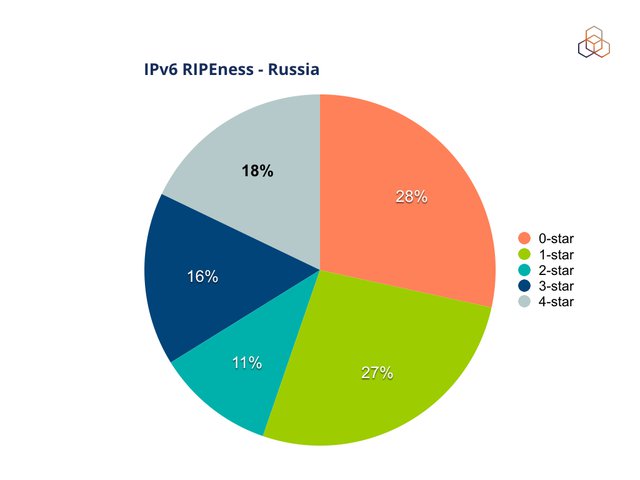
Figure 4: IPv6 RIPEness in Russia
In Figure 5, you can see the situation for all LIRs in the RIPE NCC service region. 75% of all LIRs have an IPv6 allocation, and around 46% have started using it one way or another (by meeting one of the criteria listed above).
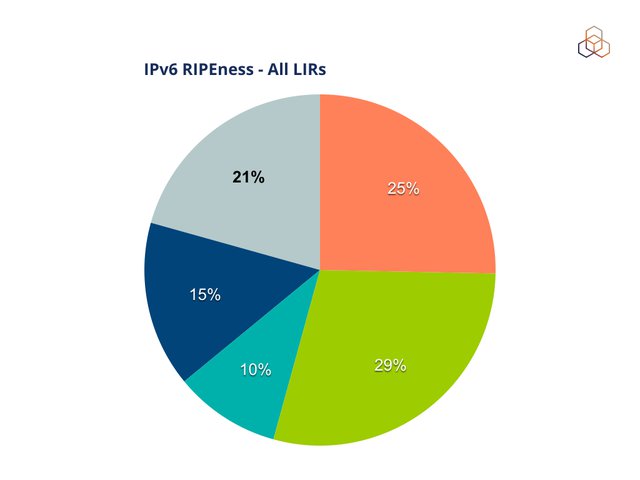
Figure 5: IPv6 RIPEness for all LIRs
In Figure 6, we show the percentage of ASes announcing one or more IPv6 prefixes in Russia and the countries we compare it with. You can find the current status of these countries using the IPv6 Enabled Networks tool. This tool also allows you to search for other countries or regions worldwide.
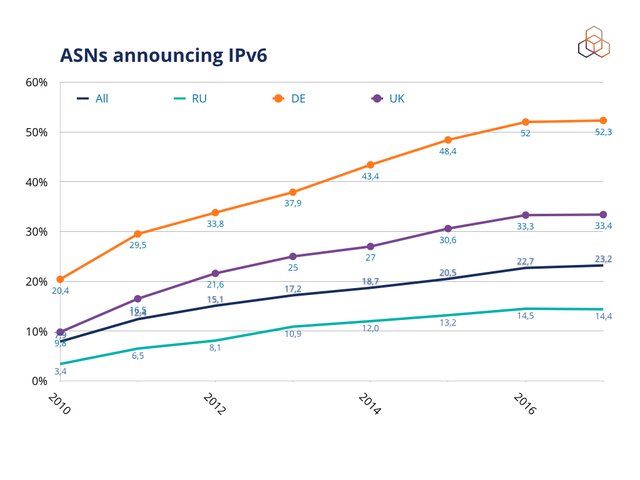
Figure 6: ASes announcing one or more IPv6 prefixes in Russia, Germany and the UK
Country Routing Statistics
Figure 7 visualises the development of the IPv4 and IPv6 prefixes and ASes in Russia over time.
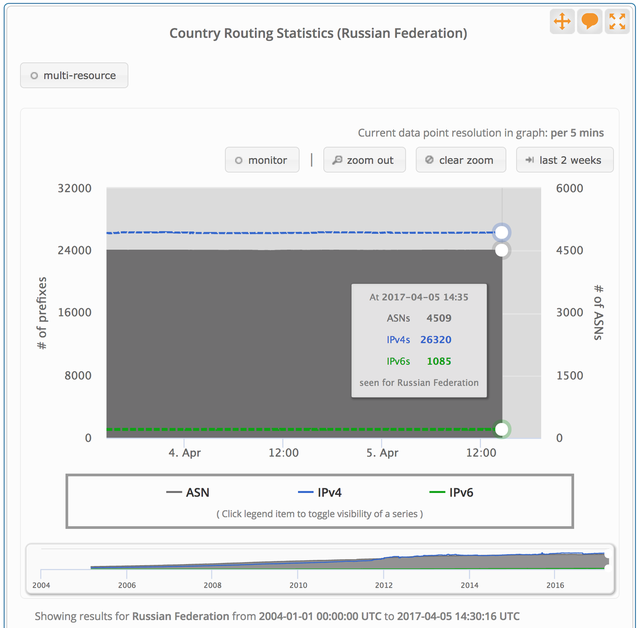
Figure 7: RIPEstat country routing statistics in Russia
You will notice that the number of IPv6 prefixes and the number of ASNs in this widget are not consistent with the number shown in the table above. The table shows those allocations and assignments made by the RIPE NCC to organisations registered in Russia. The RIPEstat widget on the other hand shows what's actually happening in the real world: The 4,616 IPv4 allocations made by the RIPE NCC have been de-aggregated into 26,320 individual prefixes that are announced by 4,509 ASes (instead of the 5,822 ASes assigned by the RIPE NCC to organisations in Russia).
You can see the current status in the RIPEstat country routing widget. You can also use that widget to compare multiple countries.
RIPE Atlas
RIPE Atlas is a global network of probes that measure Internet connectivity and reachability, providing an unprecedented understanding of the state of the Internet in real time. The more probes that are distributed and connected worldwide, the more useful data can be collected that can then be used by network operators and researchers to analyse the state of the Internet.
The embedded RIPEstat widget below shows the number of RIPE Atlas probes in the region. Green dots indicate connected probes, yellow dots show disconnected probes and red dots indicate those that are abandoned (i.e., not connected for more than three months).
If you have a RIPE Atlas probe, please double-check it is connected properly so that the community can benefit from the data it produces.
RIPEstat widget will be rendered here
Figure 8 shows the actual number of RIPE Atlas probes in Russia, Germany and the UK.
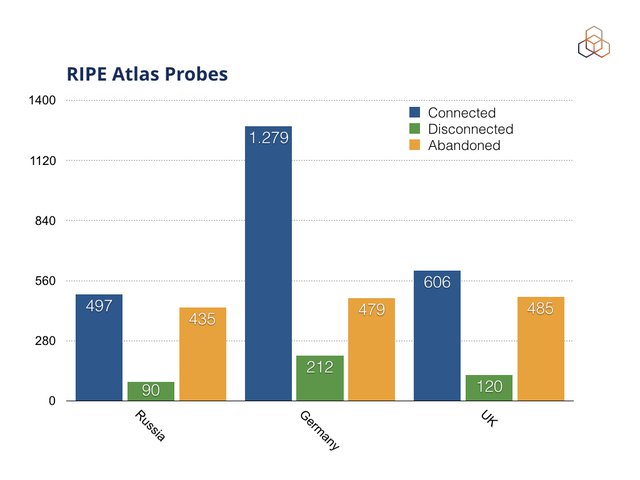
Figure 8: Number of RIPE Atlas probes in Russia, Germany and the UK
Participation at the General Meeting
The General Meeting (GM) is the forum where, twice a year, RIPE NCC members can register to have their say on how the RIPE NCC operates. All members are encouraged to register and cast their vote on such matters as the RIPE NCC Charging Scheme and who will represent them on the RIPE NCC Executive Board.
At the upcoming GM on 10 May 2017, there will be an election for three seats on the Executive Board and members will vote on the Charging Scheme for 2018. Electronic voting and remote participation options are available to all members.
Almost 1,200 members registered for the last GM in October 2016. Of these, 51 members from Russia registered to participate, or 4.23 percent of the eligible active members in Russia at the time of the GM. For comparison, the Russian registered votes were 4.28% of the total registered votes at the GM. We hope to see this figure increase in 2017. Figure 9 shows the registration numbers for Russia since electronic participation became available in 2014.
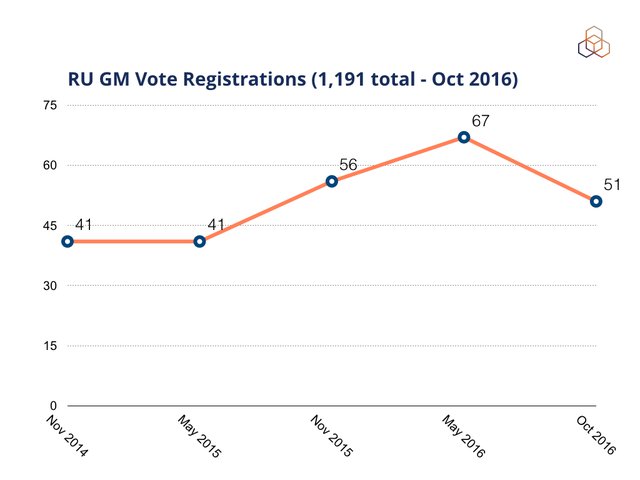
Local Networking Communities
The Eurasia Network Operators Group (ENOG) offers a great way for operators from Russia to connect with the networking community from their own country and the wider region. The ENOG mailing list provides regular updates on what's going on in Russia and surrounding countries, and it allows operators to discuss Internet-related issues in the region.
The ENOG 13 Meeting takes place in St. Petersburg from 23 - 24 May and will feature presentations from local Internet experts as well as representatives from the global Internet community.
Conclusion
The last two years have seen strong membership growth in Russia, although in contrast with many other countries in our service region the LIRs that are ten years or older are still the largest section of the membership there. Over 50% of LIRs in Russia have either not received an IPv6 allocation or have yet to use their allocation, so there is plenty of scope for growth in this area in the coming years.
If there is other information you'd like to see, or you have specific comments on the Russia information provided, please let us know in the comments below.

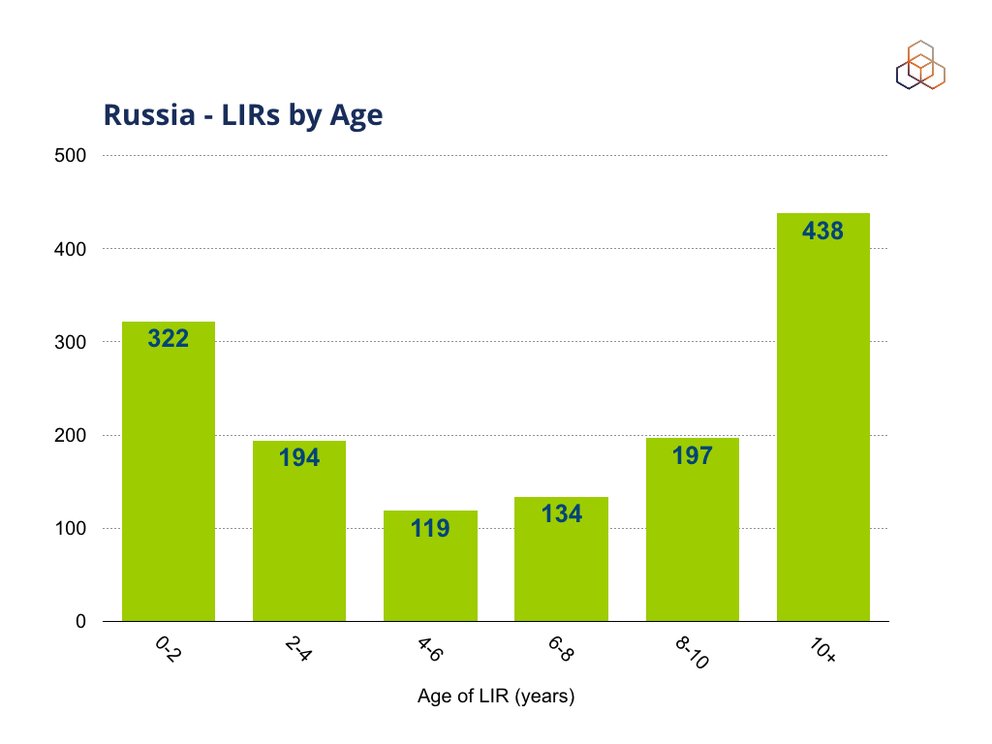
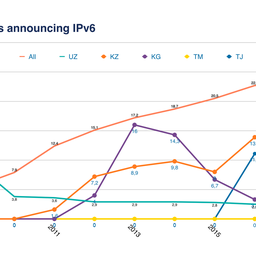
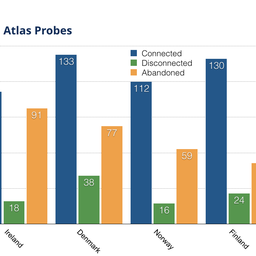
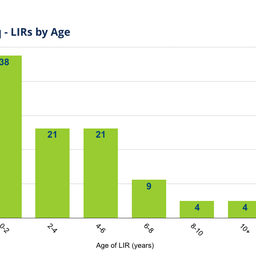
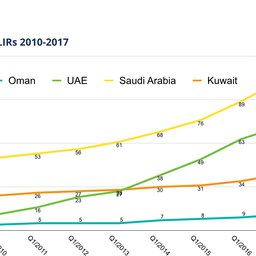



Comments 0
The comments section is closed for articles published more than a year ago. If you'd like to inform us of any issues, please contact us.